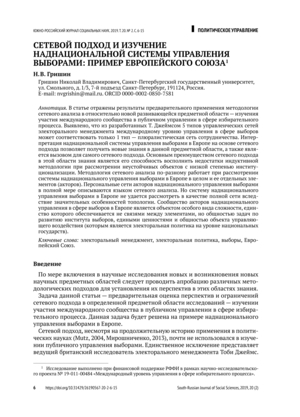Abstract
The paper describes the methodology of network analysis on its preliminary stage in a comparatively new subject area which studies how international community participates in electoral governance, and contains the results of the analysis. It is revealed that out of 5 types of governance networks of electoral management worked out by Tony James, there is only one that can satisfy the requirements of the international scale of electoral governance, namely, a pluralistic collaborative network. Using network approach in the interpretation of electoral governance at the supranational level not only allows researchers to acquire new knowledge in this subject area but also turns into its own challenge. The main advantage of using the network approach in this field of knowledge is its ability to compensate for the limitations of the inductive methodology when unstable objects with a low degree of institutionalization are under study. The methodology of network analysis works differently in considering the system of supranational electoral governance in Europe as a whole and its elements (actors), in particular. The personal networks of actors participating in supranational electoral governance are described in full measure with the help of network analysis language. But the system of supranational electoral governance in Europe cannot be regarded as a full network due to some specific features of its typology. The community of supranational actors of electoral governance in Europe is an object of a special kind of complexity, whose unity is ensured not by the links between the elements but by the common tasks of developing the institution of elections, the shared values and the common object of controlling influence, which is the electoral governance at the national level.
Keywords
Acknowledgements
The research was financed by the Russian Foundation for Basic Research (research project No. 18-78-10064 19-011-00484 “Electoral Governance at the International Level”).References
- Grishin, N. V. (2018) Nadnatsional’nyy uroven’ upravleniya v sfere izbiratel’nogo protsessa: opyt Yevropeyskogo Soyuza [The Supranational Level of Governance in the Electoral Process: The Experience of the European Union]. In Politika razvitiya, gosudarstvo i mirovoy poryadok [Development Policy, State and World Order] (pp. 151–152). M.: Aspekt-press.
- Miroshnichenko, I. V. (2013). Setevoy podkhod v politicheskikh issledovaniyakh: soderzhaniye i napravleniye razvitiya [Network Approach in Political Studies: Content and Trendst]. Chelovek. Soobshchestvo. Upravleniye [Human. Community. Management], 3, 68–86.
- Uyemov, A. I. (1978). Sistemnyy podkhod i obshchaya teoriya system [The System Approach and the General Theory of Systems]. M.: Mysl’.
- Alvarez, R. M. & Hall, T. (2008). Building Secure and Transparent Elections Through Standard Operating Procedures. Public Administration Review, 68 (5), 828–838.
- Benoit, K. (2004). Models of Electoral System Change. Electoral Studies, 23 (3), 363–389.
- Blockmans, S., Wouters, J., & Ruys, T. (2010). Making Peace Last: the EU’s Contribution to Peacebuilding. In S. Blockmans, J. Wouters, & T. Ruys (Eds.), The European Union and Peacebuilding: Policy and Legal Aspects (pp. 1–11). The Hague: TMC Asser Press.
- Borzyskowski, I. (2016). Resisting Democracy Assistance: Who Seeks and Receives Technical Election Assistance? Review of International Organizations, 11 (2), 247–282.
- Buonanno, L. & Nugent, N. (2013). Policies and Policy Processes of the European Union. Basingstoke: Palgrave Macmillan.
- Costa, O. (2016). The History of European Electoral Reform and the Electoral Act 1976. Luxembourg: Publications Office of the European Union.
- Davis-Roberts, A. & Carroll, D. (2010). Using International Law to Assess Elections. Democratization, 17 (3), 416–441.
- Donatelli, L. (2015). A Pan-European District for the European Elections? The Rise and Fall of the Duff Proposal for the Electoral Reform of the European Parliament. Brugge: European Political and Administrative Studies
- Duff, A. (2017). The rise of post-national democracy: Macron, Brexit and the electoral reform of the European Parliament. Brussels: European Policy Centre.
- Duff, A., Pukelsheim, F., Oelbermann, K.-F. (2015). The Electoral Reform of the European Parliament: composition, procedure and legitimacy. Brussels: Directorate General for Internal Policies, Policy Department C: Citizens’ Rights and Constitutional Affairs
- Elklit, J. & Reynolds, A. (2005). A Framework for the Systematic Study of Election Quality. Democratization, 12 (2), 147–162.
- Garavoglia, M. (2016). EU Election Observation Policy: A Supranationalist Transatlantic Bridge? Retrieved from https://www.brookings.edu/wp-content/uploads/2016/07/Garavoglia_USEuropeanalysisseries_EOMs.pdf
- Hix, S. & Hagemann, S. (2009). Could Changing the Electoral Rules fix European Parliament Elections? Politique européenne, 28 (2), 37–52.
- James, T. (2015). Assessing the Independence of Electoral Management Boards: A Policy Network Approach. Paper for the American Political Science Conference. San Francisco.
- James, T. (2019). Comparative Electoral Management: Performance, Networks and Instruments. Routledge: London and New York.
- Leemanna, L. & Bochsler, D. (2014). A Systematic Approach to Study Electoral Fraud. Electoral Studies, 35 (3), 33–47.
- Mutz, D. C. (2004) Cross-Cutting Social Networks: Testing Democratic Theory in Practice. American Political Science Review, 96 (1), 111–26.
- Norris, P., Frank, R. & Coma, F. (2014). Measuring Electoral Integrity: A New Dataset. PS Politics and Political Science, 47 (4), 789–798.
- Pollack, M. (2005). Theorizing EU Policy-Makin’. In H. Wallace, W. Wallace & M. Pollack (Eds.), Policy-Making in the European Union (pp. 14–47). Oxford University Press.
 Русский
Русский


